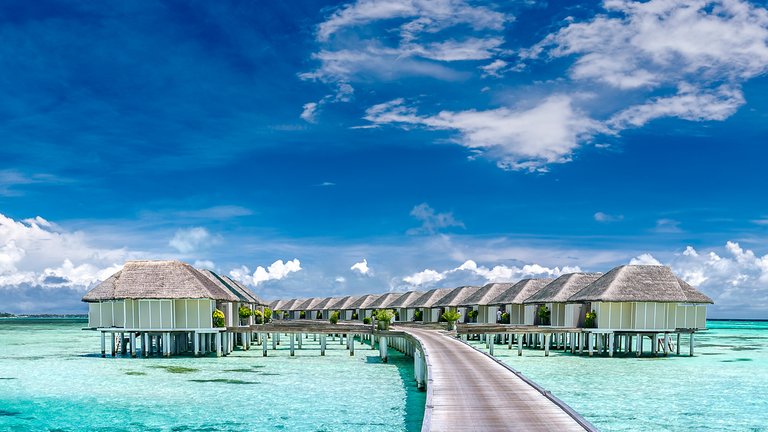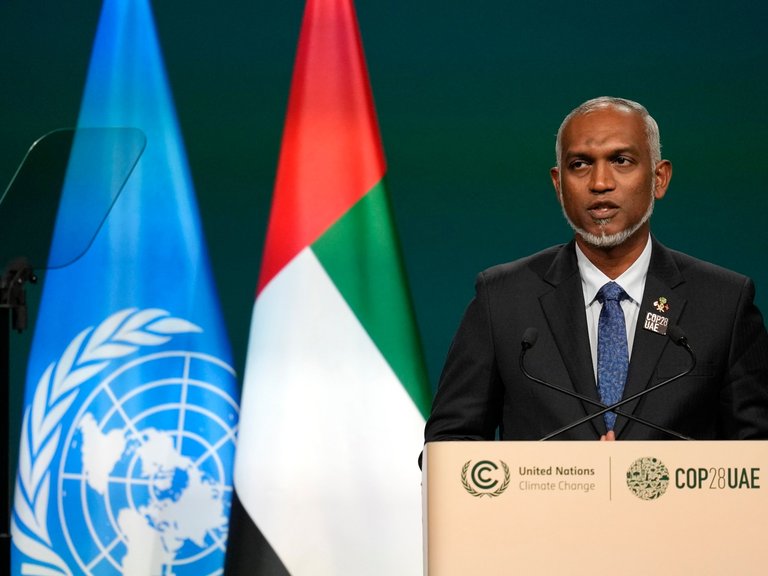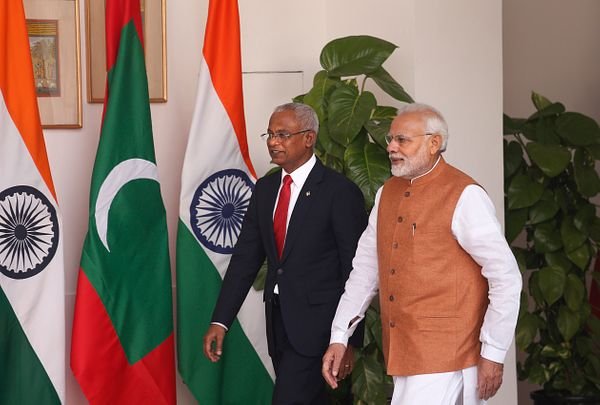___✍️
Welcome to my blog
NAMASTE (Hello) ❤🙏❤ to all of the stunning personalities of Hive community I am fine and healthy and hope that you also stay fine,happy and healthy with your family
Hello, friends! On 4th January, 2024, on his social media handles, Prime Minister Modi posted some pictures from Lakshadweep. Although there was no mention of Maldives in these pictures, some politicians in the Maldivian government reacted to these pictures in a way that led to years of friendship between the two countries being in danger today. In a few days, the situation becomes so serious that #BoycottMaldives started trending on social media. The 3 ministers of the Maldivian government, who caused the controversy are Mariyam Shiuna, Malsha Shareef and Abdullah Mahzoom Majid. Their comments on India and the Indian Prime Minister, look to be born out of insecurity. They believed that PM Modi's agenda was to make Lakshadweep and Maldives compete. But these comments included some personal attacks too On Twitter, Mariyam called PM Modi, "a puppet of Israel." Her colleagues said that these photos from Lakshadweep aimed at challenging the tourism industry in the Maldives. And Mahzoom Majid stereotyped Indians and made hateful comments against India.

SOURCE

source
Sharing photos of open urination he said that it is a part of Indian culture. These led to an outright conflict on social media. When the Indians started posting that they are cancelling their flight and hotel bookings, the Maldivian government understood the seriousness and the Maldivian Foreign Ministry stated that the opinions expressed by the ministers were their personal opinions and did not represent the views of the Maldivian government. Later, the government suspended these 3 ministers.

Maldives suspended 3 ministers
But the point isn't about Maldives versus Lakshadweep only. Not just about this social media war. The whole controversy was driven by hateful politics. A geopolitical agenda which led to all of this. Let's understand it in today's video. One thing you all would know is that Maldives is a small country. The total population of this country is only around 500,000 people. This country is made up of numerous islands. In fact, there are more than 1,000 islands. But out of these 1,000 islands, only about 200 are inhabited. Where humans live. And out of these 200, more than 150 islands are resort islands. They have been sold to private companies. And those companies have their private resorts on it. Obviously, the country depends heavily on tourism. 28% of Maldives' GDP depends on tourism. And 90% of the tax revenue for the government, comes from import duties and tourism-related taxes. And an interesting fact is that India is the number one country based on the number of tourists visiting Maldives.
In 2023, more than 200,000 Indian tourists went to Maldives. In total, approx 1.75 million tourists went to Maldives this year. So you can imagine a country with a population of 500,000, hosting more than 1.7 million tourists in a year. But the relationship between India and Maldives is much deeper than that of tourism. For years, India and Maldives have been strategic allies and there has been military cooperation between the two too. India has played a special role in initiatives like SAGAR. SAGAR stands for Security and Growth for All in the Region. Around 2008, India launched its Neighbourhood First Policy, and improved relations with Sri Lanka, Maldives, Nepal, Afghanistan, Bangladesh, Pakistan, and Myanmar. About 77 Indian military officers and soldiers are present on the Maldives islands additionally, two Dhruv Advanced Light Helicopters were donated by India to the Maldives in 2010 and 2015.
There are many reasons behind this military presence and helicopter donation. Such as helping during natural calamities, conducting search and rescue operations, airlifting medical patients between islands. But apart from this, India's warships patrol the exclusive economic zone of the Maldives too. This is the sea area surrounding Maldives where illegal activity is prevented. Basically, to prevent terrorism. Maldives had requested India to do this. In 2009, when the Maldivian government were concerned about potential terrorist attacks in their country, they had asked India for help because they did not have the capabilities in terms of military assets and surveillance. But this help and India's military presence has become a major issue of controversy in Maldives' internal politics for the last few years. Some political parties in Maldives completely oppose this and want India to withdraw its military. In fact, Maldives' current President, Mohamed Muizzu and his political party, People's National Congress, used this issue during their election campaign and came to power. The issue of "India Out."
To understand this better, we have to take a look at Maldives' internal politics. The thing is, the country was under dictatorship for 30 years. It was only in 2008 that a new constitution was adopted and a multi-party democracy system was established in their country. The elections that were conducted in 2008 was won by the Maldivian Democratic Party or MDP in short and their new President was Mohamed Nasheed. He was a successful president for the first 4 years of his term. He spread awareness on climate change issues, pledged to make Maldives carbon neutral and his foreign policy was India First. During his term, India and Maldives became close allies. And as I said, in 2009, on his request, India donated military equipment to Maldives. But in 2012, a political crisis broke out in Maldives.
And the next year, in 2013, when elections took place, a new party came to power. The Progressive Party of Maldives or PPM. The President was Abdulla Yameen Abdul Gayoom. And with the change in the governing party, the foreign policy of the country also changed. This new party opposed India. In 2016, their new government stated that India can take back the 2 helicopters that were gifted to them. After distancing themselves from India, Yameen's government got closer to China. Chinese companies were given contracts for major infrastructure projects in the Maldivian islands. And in the meantime, Maldives became a part of China's Belt and Road Initiative. Under this initiative, China wants to spend money on large infrastructure projects in different countries across the world by building roads, railways, and ports to increase its influence in Asia, Africa, and Europe.
Most of the loan terms of Chinese contracts were quite unsustainable. Because of this, many countries fall into China's debt trap. During this time, Maldives borrowed $1.5 Billion from China. Friends,
Because of this government, relations between India and Maldives got weaker and India's strategic position in this area starts weakening. After this, the next election was in 2018, once again, the governing party changed and so did the foreign policy of the country.In 2018, Ibrahim Mohamed Solih from MDP became the President. And the first thing he did was the Indian helicopters that Yameen wanted to send back, Solih extended the contract of those Indian helicopters. He wanted to keep those helicopters in Maldives. Once again, they adopted India First strategy. Thereafter, India helps the Maldivian government. India provides billions of dollars to Maldives so that they could repay the loan taken by the previous government. Even during the Covid pandemic, India provided vaccines in Maldives. One thing to note here is that even when Maldives wasn't a democracy, during the 30-year dictatorship, India-Maldives relations were still strong. Like in 1995, India built Indira Gandhi Memorial Hospital in Maldives. It is still the largest hospital in Maldives. Back to 2020, this new MDP government was extremely enthusiastic about the India First sentiment. Many bilateral agreements were signed between India and Maldives during this time. India granted $500 million for maritime connectivity. A Line of Credit of $800 million was given by Export-Import Bank of India.
Due to this India First's proactive approach, an undercurrent was spreading across the country. The sentiment of India Out. The politicians in the opposition had a negative outlook towards the alliance between the Indian government and the Maldivian government. By 2021, many journalists had written articles about it, numerous posts had been made on social media, which were openly criticising India and in many ways, degrading India. Politicians were also giving hateful speeches to end India's presence from their islands. Seeing all this, the Indian High Commission in Maldives wrote to the Ministry of Foreign Affairs of Maldives stating that the articles and social media posts were attacking Indian dignity. They asked the ministry to do something about them. This letter was leaked to Maldives' media. On 2nd July 2021, the MDP government officially apologises to India. And expresses concern that some people who are spreading hatred against India on Maldivian media and social media. Acknowledging it as wrong. Here, a local news publication DRS was mentioned with their co-founder Ahmed Azaan. Specifically, pointing out that they are the people spreading Anti-India hate.
Regarding India Out slogans, Ahmed Azaan gave a statement that the campaign does not mean that they want to expel the Indians from Maldives. They do want Indians to be safe in their country. And that the India Out movement means that they want to expel the Indian military from their country. And that the people using the India Out campaign to threaten the Indians and to attack Indians are in the wrong. He called it an issue-based movement. So the point is if this is an issue-based movement, then what are their issues? The opposition politicians claim that the agreements entered into by the MDP government with India are very confidential and their details are not revealed to the public. The then Vice President of their opposition party, PPM, Mohd Shareef said that if the details of the agreement are not presented to the country, it is a violation of democracy. The government should not hide the details by citing the excuse of national security. He used the example of the Harbour project on the Uthura Thila Falhu Island in Maldives.

source
A joint defence action plan was signed between India and Maldives in February 2021. where India's job was to develop and maintain the harbour of this coast guard. Leaked documents suggest that according to this agreement, the Indian military could stay here for decades and they would have the exclusive rights to this facility. Many Maldivian citizens were genuinely upset after hearing this. Even those who were not supporting the India Out campaign, started supporting the opposition. And because of this, when the next elections were conducted in 2023, the governing party changed again, and the PPM party that was the opposition, came back into power. This time, this PPM party formed an alliance with PNC party to be in power. And the latest President of Maldives, Mohamed Muizzu, was the candidate of this right-wing party, PNC. This happened on 30th September, 2023. This political party, which focused on the India Out issue during their election campaign is in power today.
It is also worth noting that had the previous MDP government been more transparent and had not kept the agreements so confidential, then perhaps the India Out sentiment would not have gained so much traction. And perhaps, they could have remained in power. But now, since this PPM party came into power, they took this India Out issue even more seriously than last time. Their new president Mohamed Muizzu, openly stated, four days after winning the election that Indian forces in Maldives will have to leave the country.
On 17th November 2023, he became the President officially, and only a week later, on 23rd November, he met Indian Union Minister Kiren Rijiju. He repeated the same points in the meeting that India withdraw its military personnel from Maldives. And it was only a month and a half later that the Muizzu's ministers openly started insulting PM Modi and India on public platform. When this happened, the ex-Presidents of Maldives and the MDP party, obviously, stood up in favour of India. Mohamed Nasheed and Ibrahim Mohamed Solih both condemned this hateful language against India. Now that you know these, you can understand that it was never about Lakshadweep. This was entirely about Maldives' internal politics. This India Out sentiment is a way for some Maldivian politicians to incite their citizens and to score more votes with their hateful speeches.
In 2021, when the MDP government was in power and India Out slogans were raised, then one of the MDP ministers Ali Azim had said that this anti-India movement was happening because some people enjoy making hateful speeches. Today, this is a great example of how hateful politics can be harmful to a country. You will find such politicians not only in Maldives but in every country in the world. They either spread hatred against a community, against a religion or against another country. What's unfortunate is that, many people get misled by such hateful speeches and the fear they create. If we look at the foreign policy of the new Maldivian government, it is once again leaning towards China.

source
Maybe it's just a coincidence that this entire controversy started just a day before the Maldivian President's visit to China. His trip to China was from 8th to 12th January. The Chinese state-sponsored media praised this situation stating that "it demonstrates that Muizzu is treating India with a normal mindset and steering the relationship between Maldives and India to a normal state-state relationship." It is also historic that Muizzu chose China for his first foreign trip. All the Maldivian presidents before him, came to India on their first foreign trip. Just two days ago, on 10th January, after this controversy began, President Muizzu extended an invitation to Chinese tourists to visit Maldives. Since Indians started boycotting the country, he is openly inviting Chinese tourists to his country. So, the entire issue here is about Maldives' internal politics.
The parties in favour of China versus the parties in favour of India. This also reveals that if the governing party changes once again in Maldives in 4-5 years, and the pro-India party comes to power, then India's stance towards Maldives can change again. The boycott Maldives slogans that are trending now, can turn into Go to Maldives slogans, after a few years. But regardless of what happens in Maldives' politics, we can always promote Indian tourism. One thing that we need to be cautious about is that while promoting local tourism, the local biodiversity and the local population should also be cared for. Tourism should not be at the cost of environment and the livelihoods of the locals.
I am feeling very delightful while I am sharing these pictures with my HIVE family

| ✍️ | ✍️ |
|---|---|
| ✒️Device | Smartphone |
| ✒️Model | Vivo Z1 Pro |
| ✒️Pixels | 32 Mp |
| ✒️Country | INDIA |
| ✒️State | Madhya pradesh |
A SPECIAL THANKS TO
@indiaunited @spydo @sanjeevm @visionaer3003 @bhattg
Please Do Follow them for their great work and Thank you for a regular support 😍
Owner: I AM THE REAL OWNER OF THIS PIC
THANKS FOR GIVING YOUR VALUABLE TIME TO THIS POST
- LIKE❤️
- COMMENT🖋
- SHARE🔀
YOU CAN DROP YOUR VALUABLE FEEDBACK IN COMMENT SECTION

